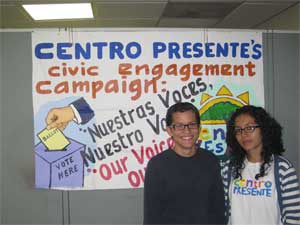By Lauren C. Ostberg

Andres Del Castillo, 19, is active in Suffolk University's Student Immigration Movement and a major proponent of the DREAM Act. Pauli Munguia, also 19, is the face of Centro Presente's civic engagement campaign. ~Photo by Lauren Ostberg
Somerville talks a good game about multiculturalism: it’s a sanctuary city whose citizens speak more than 50 different languages. But Centro Presente, a Latin American immigrant organization, wants to up the ante. The group’s civic engagement campaign brought 13 local elected officials to Centro Presente’s Somerville headquarters for a bilingual encuentro.
“Civic participation is more than just voting. It’s being an active member of your community,” said Patricia Montes, Centro Presente’s executive director. “We want to participate in the decision-making that goes on here.”
There was only time for four prepared questions, and no real decisions made, though the Mayor, Somerville Aldermen Rebekah Gewirtz, and State Senator Timothy Toomey promised to support the Dream Act. Still, Montes stressed, the event succeeded in its mission to acquaint Somerville’s policy-makers with the Centro Presente community’s issues, and vice versa.
Education and funding
Officials struggled most with the third question, posed by Somerville High School sophomore Pauli Munguía. She inquired about programs that are currently on offer for non-native English speakers in Somerville schools, and the likelihood of their continued funding, given the financial situation of the last few years.
Massachusetts’s bilingual education program was voted down by referendum in 2002, so that is no longer an option on offer. State Senator Tim Toomey, formerly a member of the Cambridge school committee, founded Cambridge’s “Amigo” language-exchange program, and has since added “Hola!” a Portuguese-English exchange. Ward 4 Alderman Walter Pero, who has spent 20 years working for the Department of Education, offers English lessons once a week to build parents’ language skills. “You can measure the educational success of a child by thinking about their mother’s highest level of education,” he said.
State Senator Patricia Jehlen mentioned the multilingual Parent Information Center, as well as Unidos, Somerville’s two-way bilingual exchange program. She underlined the importance of language in access to opportunities, touching on the debate over the restructuring of The Healey School. “Sometimes people who don’t speak English as their first language don’t get involved in those decisions as early in the process,” she said.
Jehlen also admitted that potential cuts in state funding – at least $2.5 billion, she predicts, if Question 3 passes – then Somerville would face substantial cuts as well.
Ward 2 Alderman Maryann Heuston, Chair of the Finance Committee, said she is proud she accepted the school’s budget requests every year, and believes this reflects the premium the city places on education. Mayor Curatone said Somerville has received between $15 and $18 million less from the State this year than it did in 2002. The general consensus was that, though education remains a top priority, the city is not likely to maintain level services if it is working with a fraction of its funds.
Law enforcement
“What is the role of local law enforcement in the implementation of federal immigration laws?” asked Gabriel Camacho, President of Centro Presente’s Board of Directors. The response was unanimous – none.
Alderman-at-Large Dennis Sullivan said Somerville’s police force exists to make sure the rights of its community members are respected. “I believe they’re there to protect everyone’s rights, even those who are not citizens,” he said. Heuston cited the police force’s diversity, calling it “a reflection of the community.”
Many undocumented immigrants – Centro Presente’s preferred term – don’t report crimes to the police, for fear they’ll be questioned about their citizenship. “Without your help, without gaining your trust in us, we cannot fix this city’s problems,” said Curatone.
Aldermen Pero agreed. “It should be, ‘Can I help you?’ not ‘Are you a citizen?’” he said.
The aldermen seemed confident that Somerville’s police force was not enforcing federal immigration rules, but, in case of doubt, Jehlen suggested that any rumors of an alliance between the police force and ICE should be reported and discussed immediately. Ward 5 Aldermen Sean O’Donovan said, “Call City Hall if you’re not comfortable calling the police department.”
“We’re here to protect and serve you,” Alderman-at-Large John M. Connolly said.
Informal proceedings
The encuentro was advertised as an informal event, and a few politicians became comfortable enough to emphatically discuss topics that were slightly off the question’s path: Gewirtz seethed against the Tea Party, Alderman-at-Large William White eloquently dispatched Arizona’s immigration amendment and the nation’s growing poverty, and all of the aldermen bared their immigrant roots.
Several speakers indicated their desire for a dialogue – “You could probably tell us more than we’re telling you,” Jehlen said – and hoped that, as Montes had noted earlier, that this meeting was a small step in a movement for more participatory democracy.
“We meet on Tuesday and Thursday. You should all come in, sit behind us,” said Heuston.















Reader Comments